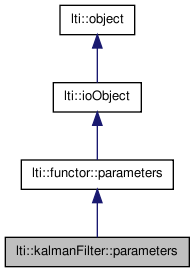

|
latest version v1.9 - last update 10 Apr 2010 |
|
The parameters for the class kalmanFilter. More...
#include <ltiKalmanFilter.h>


Public Member Functions | |
| parameters () | |
| parameters (int systemDimension, int measurementDimension, int controlDimension) | |
| parameters (const parameters &other) | |
| ~parameters () | |
| const char * | getTypeName () const |
| parameters & | copy (const parameters &other) |
| parameters & | operator= (const parameters &other) |
| virtual functor::parameters * | clone () const |
| bool | consistent () const |
| virtual bool | read (ioHandler &handler, const bool complete=true) |
| virtual bool | write (ioHandler &handler, const bool complete=true) const |
Public Attributes | |
| vector< float > | initialSystemState |
| matrix< float > | dynamicsMatrix |
| matrix< float > | controlMatrix |
| matrix< float > | measurementMatrix |
| matrix< float > | measurementNoiseCovariance |
| matrix< float > | processNoiseCovariance |
| matrix< float > | initialErrorCovariance |
The parameters for the class kalmanFilter.
| lti::kalmanFilter::parameters::parameters | ( | ) |
Default constructor.
All initial values (vectors and matrices) are initialized empty, i.e. they have 0 or 0x0 dimensions.
Reimplemented from lti::functor::parameters.
| lti::kalmanFilter::parameters::parameters | ( | int | systemDimension, | |
| int | measurementDimension, | |||
| int | controlDimension | |||
| ) |
This constructor creates all initial values (vectors and matrices) with matching dimensions, containing only zeros.
| lti::kalmanFilter::parameters::parameters | ( | const parameters & | other | ) |
copy constructor
| other | the parameters object to be copied |
| lti::kalmanFilter::parameters::~parameters | ( | ) | [virtual] |
destructor
Reimplemented from lti::functor::parameters.
| virtual functor::parameters* lti::kalmanFilter::parameters::clone | ( | ) | const [virtual] |
returns a pointer to a clone of the parameters
Implements lti::functor::parameters.
| bool lti::kalmanFilter::parameters::consistent | ( | ) | const |
Check the consistency of the parameters.
The parameters are consistent if certain dimensions match each other, e.g. the dynamicsMatrix must be square and must have as many rows as the system state. Additional consistency checks are performed for each measurement and control vector.
| parameters& lti::kalmanFilter::parameters::copy | ( | const parameters & | other | ) |
copy the contents of a parameters object
| other | the parameters object to be copied |
| const char* lti::kalmanFilter::parameters::getTypeName | ( | ) | const [virtual] |
returns name of this type
Reimplemented from lti::functor::parameters.
| parameters& lti::kalmanFilter::parameters::operator= | ( | const parameters & | other | ) |
copy the contents of a parameters object
| other | the parameters object to be copied |
| virtual bool lti::kalmanFilter::parameters::read | ( | ioHandler & | handler, | |
| const bool | complete = true | |||
| ) | [virtual] |
write the parameters in the given ioHandler
| handler | the ioHandler to be used | |
| complete | if true (the default) the enclosing begin/end will be also written, otherwise only the data block will be written. |
Reimplemented from lti::functor::parameters.
| virtual bool lti::kalmanFilter::parameters::write | ( | ioHandler & | handler, | |
| const bool | complete = true | |||
| ) | const [virtual] |
write the parameters in the given ioHandler
| handler | the ioHandler to be used | |
| complete | if true (the default) the enclosing begin/end will be also written, otherwise only the data block will be written. |
Reimplemented from lti::functor::parameters.
matrix that describes influence of control input on system state (rarely used at LTI) (B)
matrix that describes system dynamics (A)
Initial estimate error covariance (P).
This value is used either for  or
or  , depending on whether the first update is a measurement or a time update (respectively).
, depending on whether the first update is a measurement or a time update (respectively).
Initial system state (x).
This value is used either for  or
or  , depending on whether the first update is a measurement or a time update (respectively).
, depending on whether the first update is a measurement or a time update (respectively).
matrix that relates the system state to the (expected) measurement (H)
measurement noise covariance (R)
process noise covariance (Q)